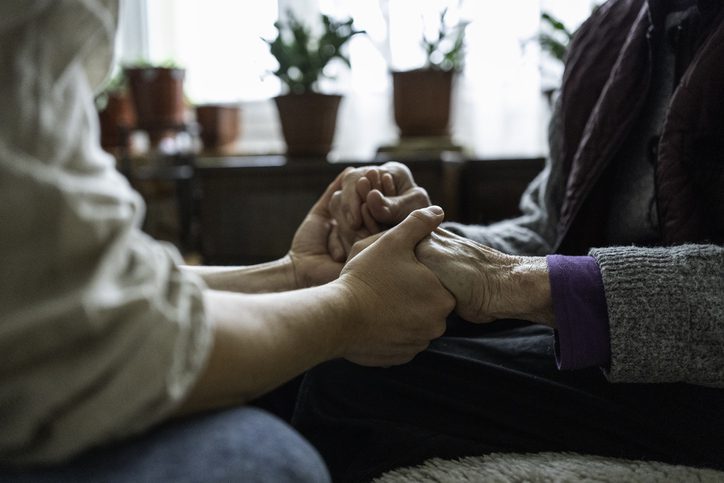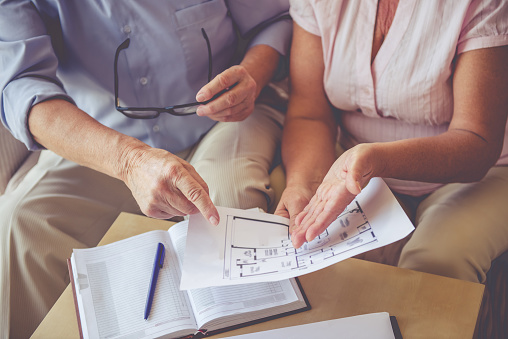Natural disasters happen all the time – yet it’s not uncommon for individuals and families to find they are ill-prepared to handle the event. This may be especially true if you are a family caregiver and provide care to someone who has Alzheimer’s disease or another type of dementia. Just thinking about how you would help that person if a tornado, hurricane, wildfire, earthquake, flood or other natural disaster occurred can be overwhelming. One of the most effective ways of preparing for a potential disaster is to talk about it with your family or friends and create a plan for yourself and your loved one with dementia or Alzheimer’s.
While the thought of preparing for a storm for both you and your loved one may be daunting, you don’t have to do it alone. Engaging others will make your job easier and less stressful. You’ll undoubtedly find that they want to help and appreciate being involved. The first three tasks to consider are to:
- Talk with family and friends who can provide support.
- Develop a plan with your loved one’s professional caregivers.
- Research where you would go should you need to evacuate.
- Talk with friends and family.
Your first priority should be to think through whom you could call on for help in a variety of situations – from neighbors nearby to relatives several states away – and get their agreement to be part of your disaster support network.
Diversity in your network is critical. The nature of a disaster can mean that those you thought would be your first line of support may be unable to assist – possibly because they’re caught up in the disaster themselves.
A diverse network gives you necessary options; you cannot count on any one person’s ability or willingness to help when you need support the most.
Who should be in your support network?
Your support network should include people who might help you:
- Prepare for a disaster – such as helping you stock up on necessary supplies or securing your home
- Evacuate – such as helping you pack beloved photos or transporting you out of harm’s way
- Care for your loved one – if you can’t get there
Help for Your Loved One – If You Can’t Be There
Consider the possibility that you might be unable to get to your loved one, especially if a disaster were to develop suddenly. You could be working, shopping or sick. To whom would you turn for help? Perhaps you have a job that would likely require your presence before, during or after a disaster. If so, who would assume responsibility for your loved one?
A close neighbor or nearby family member may be your best choice, but think that through. Ask that person if they’d be willing to accept such a critical role, and if they understand the difficulties that could be involved. Ideally, such a person should:
- Have spent some time with your loved one so that he or she is a familiar face
- Have some understanding of your loved one’s limitations
- Be fully aware of the type of care that would be required, and be physically and emotionally able to perform typical caregiving tasks
If you have people on whom you can rely, you’ll need to be sure they are prepared well in advance.
Consider taking these steps:
- Develop a document describing your loved one’s behaviors, needs, likes and dislikes, medications and doses. Include a list of doctors, pharmacies and their phone numbers, as well as family members who might be called on for assistance if needed.
- Review the document thoroughly with your potential caregivers, keeping in mind that your loved one might be more challenging to care for in a crisis situation. Give a copy of the completed document to your substitute caregiver(s).
You’ll need to obtain the agreement of more than one person who might help, considering that some may be preoccupied with caring for their own families or otherwise be unavailable.
Meet With Your Professional Caregivers
If your loved one receives services from a paid professional or agency inside or outside the home, meet with the managers to learn exactly what their policy is in the event of a disaster. What would they – and you – be expected to do? It’s critical that you have these conversations in advance so that you can ask questions, settle any issues or make arrangements that you might not have anticipated needing.
Research Where You Would Go
Should you need to evacuate, many factors will influence your choice of destination, including: the type of disaster; where and how far you can travel safely; your loved one’s comfort level with any who might take you in; any previous experience with evacuation; and your financial situation.
Faced with all of these considerations, you will be much better prepared to select a destination if you have already researched a variety of options, thinking about what might be best for your loved one – and for you – in a difficult situation. Consider the following:
- Are there family members or friends to whom you could go? Would they be able to accommodate you, and would you and your loved one be relatively comfortable?
- Might a hotel be a better choice? You’ll need to consider the cost – but for some, a hotel could be an excellent option. If you live in an area prone to tropical storms or hurricanes, make a list of hotels, including their addresses and telephone numbers, along your likely evacuation routes and keep it in the glove compartment of your car.
- If a shelter would seem to be your best – or only – option, what should you know ahead of time? Talk with emergency management professionals in your community (such as the fire department or your American Red Cross chapter) to learn what you can about the location, accommodations, and overall management of the nearest shelter. Inquire about what you can bring from home, as well as whether you can expect any special assistance with your loved one’s needs.
Special Needs Shelters
Some parts of the country offer “special needs shelters” that are designed to accommodate people, such as those with health issues, who could not function in a regular emergency shelter environment. Ask your healthcare provider or your loved one’s doctor if they are aware of this type of shelter in your area or check with the local American Red Cross chapter. Now is the time to determine if your community – or a community to which you would likely go – has such a facility, and to learn the ground rules for admission and/or pre-registration requirements.
While a general disaster shelter could be the only option you would have if you are forced to evacuate, you may wish to consider such a facility a last resort for persons with dementia and their caregivers. Such a place would likely be crowded and noisy – a difficult environment for your loved one.
Plan for Pets
No matter what your preferred evacuation destination, if your loved one has pets:
- Ask whether pets are accepted.
- If they aren’t accepted, find out if there is another home, hotel or shelter that would take pets, or if there is an option of another facility where pets alone would be accepted.
As difficult as it can be for anyone to be separated from pets in a crisis, for a person with memory loss this separation can be traumatic. Pets can provide reassurance and be a calming influence. If at all possible, find a home, hotel or shelter that would allow pets to stay with their owners.
A benefit of early planning is the opportunity to talk with others and thoroughly research what your options might be. Know the reality of what you’d be getting into and plan accordingly. After you build your support network, it’s time to take action.






